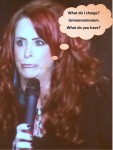Last updated on January 26th, 2019 at 01:11 am
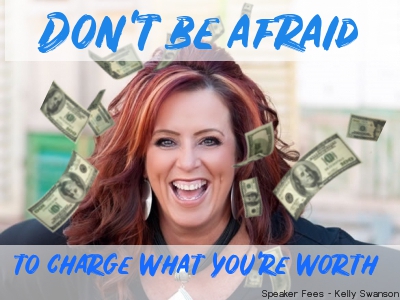 As a big dreamer who is learning how to be a motivational speaker, what are you going to do when a prospective client doesn’t have the money in their budget to pay you the speaking fee you want to charge?
As a big dreamer who is learning how to be a motivational speaker, what are you going to do when a prospective client doesn’t have the money in their budget to pay you the speaking fee you want to charge?
First, you should breathe. All successful speakers face speaking fee negotiations.
Any paid public speaker who tells you they never lower their fee, either has so much business they can afford to take only the clients who will pay full price. Or they are major celebrities. Or they don’t want to work very much.
Or they’re lying.
Negotiation is as much a part of a professional speaking business as it is any other type of entrepreneurial enterprise. Every speaker I know has worked and accepted fees at different price points.
Sales conversations can be grueling. For years, I hated them. When the moment arrived to talk about cost, my mouth went dry, I’d stammer, and I’d take whatever price is offered. I cringe when I think back on my behavior, but I don’t beat myself up too much. I was new. I was learning the business of being a paid public speaker. I was learning my market. And I was learning how to sell myself.
Lack of knowledge is merely that: a lack of knowledge. The more you practice selling, the better you get, and the easier it becomes. Today, I LOVE it when I get a potential client. Selling is fun now that I know what I’m doing.
Which brings me back to the original quandary:
Can Paid Speakers Lower a Speaking Fee and Retain Respect?
The one thing I don’t want to do is tell potential clients that my speaking fee is $5,000.00, but in their case, I’d take $2,000.00. If I did this, I’d appear unprofessional, and this might lead the client to believe I was trying to rip them off.
Here is how I prefer to handle the speaking fee conversation:
• In the initial part of the interview, where they are telling me about who they are and what they need, and we discuss what working together could look like, I am quickly assessing:
– is this a speaking job I can do,
– is this a speaking gig I want to do,
– how much more business can I get from the experience,
– how much product can I sell,
– where is it and how far do I have to travel,
– how much prep work is involved, and
– how hard is this group of people to connect with, etc.
There are a lot of factors that help me determine what a job is worth to me. I don’t operate by a simple, “Here’s my speaking fee, take it or leave it” mindset. Every situation is unique.
• In many cases, based on prior experience, I already know how much money they are probably going to have. I wait for them to tell me, but I still have a good idea when someone is going to ask me to lower my speaker fee.
• I determine in this initial data gathering stage, how much I want the paid speaking job, what it’s worth to me, and how much I am willing to do the job for if they don’t have enough in the budget for my fee. If I’m not sure, I can always take my time deciding, since I have the option of ending the call and sending a proposal later. Finishing the call gives me time to think.
Here is how I word my answer to a client:
• “I think I have everything I need to put together a proposal for you. Please give me until the end of the day to send it over and then we can discuss.”
• Sometimes I will say, “My proposal has three different packages in it, based on different needs. The packages run from X to X. How does your budget align with that?” Just to make sure we’re on the same page. If their budget is WAY lower, then I know to either adjust my numbers or go ahead and jump right to it and decide whether I can work for that or not.
If I am offered less than my standard speaking fee, here is what I say IF I want the job:
• “I understand that you are working from a smaller budget. Many of my clients are in the same position, and I try to work with them as best I can. Tell me what you do have, and we’ll talk about ways that we can make up the difference and find something that makes us both happy.”
They tell me what’s budgeted. If it’s too low, I turn the speaking request down nicely and recommend a speaker who is more in line with their budget. If I’m willing to work for their budgeted amount, I look for other things that have value for me. I say this:
“Okay. If I were going to speak for the [X] fee you are offering, here are some things that would help me justify lowering my speaking fee:”
• Do you have any other open slots for speakers? If you do, you can have me do one of those slots, and pay me what you would have paid a different speaker, or even a little less, saving you money on booking two speakers.
• Can I add value to what I’m doing? What if I offer a webinar before or after the conference? What if I do an extra session? What if I give a free gift to all attendees? What if I write an article for your industry newsletter? Are there other services I can provide that you can pay for with separate budgets?
• Do you have a budget for attendee gifts? If so, why not give them a copy of my book? If you purchase one for everybody in the audience, you can pay for that out of a different budget.
• Are you connected to other associations like yours? Would you agree to send a testimonial to all the other chapters, telling them how I did?
• Can you give me exposure on any prominent websites that get a lot of traffic, with a link to my website?
• Can I sell books, and you provide a table right outside the room where I speak, with someone to handle book sales for me?
• Can you find a sponsor who would be willing to pay my fee in return for getting ad space in my handout or free-gift?
• Can you find someone else in the area who is willing to book me while I’m in town?
• Do you hold other events where you book speakers and guarantee me a slot there too?
• Will you videotape my speech with two cameras, and give me a copy of it?
Note that in this preliminary sales call, I have already determined I want the paid speaking job and I am willing to go for what they will offer; I’m just keeping my self-respect and making sure I’m not only lowering my speaking fee, but giving the client a way to trade the difference and provide something of value to me in return.
Remember to think of your speaking fee negotiations as a win-win bargaining exchange where both parties end the discussion feeling valued, respected, and excited about the job.
Kelly Swanson
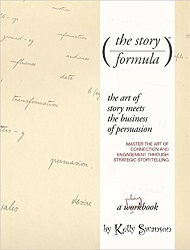 | 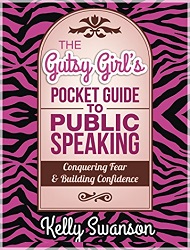 | 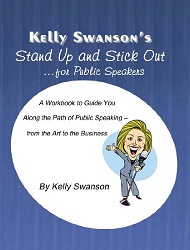 | 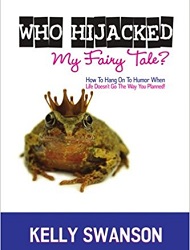 |
|---|
Kelly Swanson is an award-winning storyteller, comedian, motivational speaker, Huffington Post Contributor, and cast member of The Fashion Hero television show airing on Amazon Prime. She is also the author of Who Hijacked My Fairy Tale, The Land of If Only, The Story Formula, and The Affirmation Journal for Positive Thinking. She was a featured entertainer for Holland America Cruise Lines, keynote speaker for the International Toastmasters Convention, and has keynoted major conferences and corporate events from coast to coast. She just launched her one-woman show Who Hijacked My Fairy Tale in theaters, and it is being booked all over the country. In July of 2022, she was inducted into the National Speakers Association Speaker Hall of Fame.
Note: Articles by Kelly may contain affiliate links and may be compensated if you make a purchase after clicking on an affiliate link.



